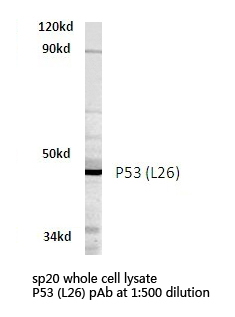p53 (TP53) Rabbit Polyclonal Antibody
Other products for "TP53"
Specifications
| Product Data | |
| Applications | IHC, WB |
| Recommended Dilution | Western blot: 1/500-1/1000. Immunohistochemistry on Paraffin Sections: 1/50-1/200. |
| Reactivities | Human, Mouse |
| Host | Rabbit |
| Clonality | Polyclonal |
| Specificity | This antibody detects endogenous levels of P53 protein. |
| Formulation | Phosphate buffered saline (PBS), pH~7.2 State: Aff - Purified State: Liquid purified Ig fraction (>95% pure by SDS-PAGE) Preservative: 15 mM sodium azide |
| Concentration | 1.0 mg/ml |
| Purification | Affinity Chromatography using epitope-specific immunogen |
| Storage | Store undiluted at 2-8°C for one month or (in aliquots) at -20°C for longer. Avoid repeated freezing and thawing. |
| Stability | Shelf life: one year from despatch. |
| Predicted Protein Size | ~ 53 kDa |
| Gene Name | Homo sapiens tumor protein p53 (TP53), transcript variant 1 |
| Database Link | |
| Background | p53 is a DNA-binding, oligomerization domain and transcription activation domain-containing tumor suppressor that upregulates growth arrest and apoptosis-related genes in response to stress signals, thereby influencing programmed cell death, cell differentiation and cell cycle control mechanisms. p53 localizes to the nucleus yet can be chaperoned to the cytoplasm by the negative regulator MDM2, an E3 ubiquitin ligase that is upregulated in the presence of active p53, where MDM2 polyubiquitinates p53 for proteasome targeting. p53 can assemble into tetramers in the absence of DNA, fluctuates between latent and active (DNA-binding) conformations, and is differentially activated through posttranslational modifications including phosphorylation and acetylation. Mutations in the DNA-binding domain (DBD) (amino acids 110-286) of p53 can compromise energetically favorable association with cis elements and are implicated in several human cancers. |
| Synonyms | Cellular tumor antigen p53, Tumor suppressor p53, Phosphoprotein p53, NY-CO-13 |
| Reference Data | |
| Protein Families | Druggable Genome, Stem cell - Pluripotency, Transcription Factors |
| Protein Pathways | Amyotrophic lateral sclerosis (ALS), Apoptosis, Basal cell carcinoma, Bladder cancer, Cell cycle, Chronic myeloid leukemia, Colorectal cancer, Endometrial cancer, Glioma, Huntington's disease, MAPK signaling pathway, Melanoma, Neurotrophin signaling pathway, Non-small cell lung cancer, p53 signaling pathway, Pancreatic cancer, Pathways in cancer, Prostate cancer, Small cell lung cancer, Thyroid cancer, Wnt signaling pathway |
Documents
| Product Manuals |
| FAQs |
{0} Product Review(s)
0 Product Review(s)
Submit review
Be the first one to submit a review
Product Citations
*Delivery time may vary from web posted schedule. Occasional delays may occur due to unforeseen
complexities in the preparation of your product. International customers may expect an additional 1-2 weeks
in shipping.






























































































































































































































































 Germany
Germany
 Japan
Japan
 United Kingdom
United Kingdom
 China
China




